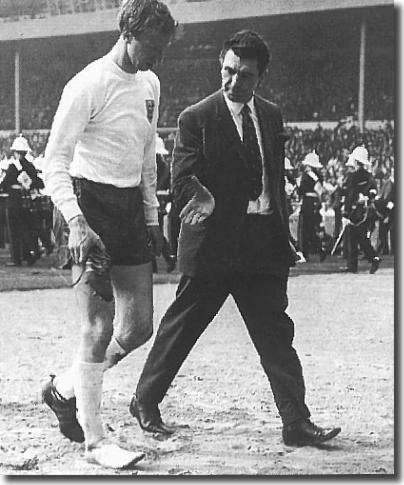 Part 1 The early years - Part
2 1966 and all that - Part 4 Football Manager
- Part 5 The Irish Saviour
Part 1 The early years - Part
2 1966 and all that - Part 4 Football Manager
- Part 5 The Irish Saviour
After the ecstasy of England's World Cup win, 1966/67
was a frustrating season for Jack Charlton, although he was to end it
as Footballer of the Year. Leeds finished fourth in the league and lost
in an FA Cup semi-final against Chelsea. Charlton missed that game because
he had sustained an injury in England's match against Scotland in April.
He played on after the injury and scored one of the goals as England lost
3-2, their first defeat since the World Cup triumph. Jack had also scored
in the previous international, a 5-1 thrashing of Wales back in November,
but his season was now over. He played his 400th league game for Leeds
in a 3-1 home win over Arsenal in October and was now in sight of Ernie
Hart's club record of 447 league appearances.
Winning the Footballer of the Year award was something of a compensation
for the club's disappointments and led to a whole new career for Jack
as an after dinner speaker:
Charlton: 'I knew in advance that I'd won it, and I was told that I had
to make a speech at the dinner. I had been to plenty of these dinners
before, of course, and normally the person receiving the award didn't
say much, just a few thank yous really, before sitting down.
'Anyway, I'd written out something like that before I drove down to London
with a friend, and ex-rugby player called Dave Croft. On the way down,
we came to a place where the road was up on one side, and there was single
lane traffic controlled by traffic lights for about two hundred yards.
We were at the head of the queue, and when the lights changed to green
we started driving through, but suddenly a guy on a moped appeared coming
in the other direction. Dave had to slam on his brakes, and the other
guy fell off his moped. Dave was very angry. He rolled down the window
and shouted, "What the hell are you coming through for? Didn't you
see those lights were red?"
'"Yes," said the other guy, picking up his bike, "I did
see the lights were red, but I chose to disregard them."
'I just collapsed laughing.
'I sat next to the chairman at the dinner. When the time came for me
to speak I didn't read the notes, I just started telling them about the
guy on the moped. They all seemed to enjoy that, so then I told them some
other stories. Apparently I spoke for fifteen minutes or so, and it went
down extremely well. No other footballer had ever made a proper speech,
apart from the usual thank yous. I got a standing ovation at the end.'
back to top
Jack went on to make considerable money as an after dinner speaker,
particularly after Yorkshire and England fast bowler Fred Trueman advised
him to charge decent rates.
Jack recovered from 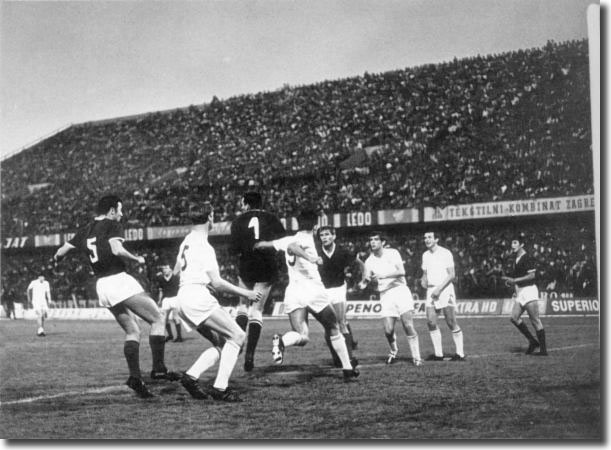 his
injury during the summer and returned for the 1967 Inter Cities Fairs
Cup final against Dinamo Zagreb, held over until late summer. Leeds
lost 2-0 in the away leg, but fancied their chances in the return
at Elland Road. Jack had a goal disallowed and another effort cleared
off the line as Leeds could do no better
than 0-0 and another runners-up finish.
his
injury during the summer and returned for the 1967 Inter Cities Fairs
Cup final against Dinamo Zagreb, held over until late summer. Leeds
lost 2-0 in the away leg, but fancied their chances in the return
at Elland Road. Jack had a goal disallowed and another effort cleared
off the line as Leeds could do no better
than 0-0 and another runners-up finish.
1967/68 was better, however.
Leeds lost another FA Cup semi-final,
this time 1-0 to Everton, but won the League Cup in March when a Terry
Cooper long range shot helped them force an unattractive
but very satisfying 1-0 win over Arsenal. Jack was closely involved
with the winner:
'The Arsenal lads weren't best pleased with me because I'd been up to
challenge for the ball on a corner crossed in by Eddie Gray - and they're
complaining that I pushed the goalkeeper, which in fact was never the
case. All I was doing was making it difficult for the keeper to see and
get the ball, like I always did.'
Leeds also became the first British side to win the Fairs Cup that year.
The final against Ferencvaros was again held over until the start of the
following season and Leeds held out
for a 0-0 draw in Hungary after winning 1-0
in the first leg at Elland Road. So after three years of near misses,
Leeds had finally come good with two trophies in the space of a few months,
but even better was soon to come.
On a personal front, Jack finally broke Ernie Hart's club record of 447
league games when he played in a 1-1 draw at Newcastle in March.
'The 1968/69 season was the
year we finally shook off the label of second best. We lost only two league
games all season and clinched the title when we
drew 0-0 with Liverpool at Anfield on 28 April 1969. You've got to
remember that Liverpool were THE big team of the time, and they were pressing
us hard in the championship even though we had built up a record number
of points. The atmosphere in the crowd was incredible, and we were still
out on the field enjoying the cheers twenty minutes after the end of the
game.
'I have to admit it surprised me that Liverpool fans reacted the way
they did that night; I hadn't expected them to be so generous. They called
me "Dirty Big Giraffe" - but it was affectionate, and Anfield
became my favourite away ground after that. Shanks came into the dressing
room to congratulate us afterwards. "You're worthy champions,"
he said generously. "If it wasn't going to be us, you're the next
best."'
The following season, 1969/70,
was a remarkable one for Leeds. They
kicked off by winning the Charity Shield. Jack got the winner in a
2-1 victory over Manchester City, and a month later played his 500th league
game for the club in a 2-2 draw at home to Manchester United.
Leeds had started getting some positive press at last as they went for
a more progressive and open style of play. They
won 10-0 and 6-0 in their first European Cup games against Lyn Oslo
of Norway and were making good progress on the three fronts of Europe,
the league and the FA Cup and for many months a unique treble looked on.
However, in the end the strain of too many games in too short a period
told badly. The season was shortened by about three weeks to allow the
England squad to fly out early to get acclimatised to playing at the high
altitudes they would face in the World Cup Finals in Mexico. Leeds were
in for everything and were rapidly building up a massive backlog of fixtures.
They had three gruelling battles with Manchester United in the FA Cup
semi-finals before a Billy Bremner goal finally won the tie in the midst
of a killing spell of eight games in the space of fifteen days.
Leeds had already conceded their title to Everton, but still had the
Cup and Europe to play for. Unfortunately, Celtic
came to the first leg of the European Cup semi-final at Elland Road and
stole a 1-0 lead with a scrappy early goal on the same night Everton
formally secured the league title.
back to top
'Before we played the second leg in Glasgow we had to go to Wembley for
the FA Cup final against our old enemies
Chelsea. We should have won, because we dominated the game from start
to finish. I headed the first goal from a corner kick, but then Chelsea
equalised after Gary Sprake dived over the ball. Then, only seven minutes
from the end, Clarkey's shot hit the post and 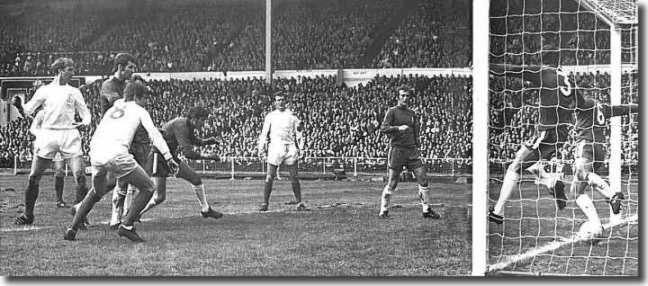 Mick
Jones scored on the rebound. We thought we had it won, but then they got
a free kick, the ball got played in, and Ian Hutchinson suddenly appeared
at the near post to make it 2-2.'
Mick
Jones scored on the rebound. We thought we had it won, but then they got
a free kick, the ball got played in, and Ian Hutchinson suddenly appeared
at the near post to make it 2-2.'
Extra-time brought no further goals, so, inevitably in that draining
season, there was to be a replay, something which had never previously
been necessary. Four days later, Leeds
were out of the European Cup after a 2-1 defeat in the second leg of the
semi-final against Celtic.
'The replay of the FA Cup final took
place at Old Trafford at the end of April. At Wembley Eddie Gray had
run Chopper Harris to bits, but in the first few minutes of the game Chopper
gave Eddie a beauty. Eddie stayed on the field, but he was virtually a
spectator after that.
'Clarkey went on a brilliant run before setting up Mick Jones to score
the opening goal. But twelve minutes before time, Chelsea equalised through
a Peter Osgood header. I blame myself for that goal. I'd been waiting
on their goal line for a corner kick when one of the Chelsea players whacked
me in the thigh with his knee. After the corner was cleared I started
to chase him, way over to the right. Then the ball was knocked in long
to our box and I started to run back, but I was still hobbling after the
whack in the thigh and I couldn't get there in time to stop Peter Osgood
heading the goal.
'So we were again in for extra-time. Ian Hutchinson did one of his long
throw ins, and I remember jumping and heading the bloody thing. Then John
Dempsey climbed on top of Terry Cooper to flick the ball on, and somehow
it finished at the far post for Dave Webb to nod the ball in. It was the
first time they'd been ahead in 224 minutes' play, but that was how it
stayed. It seemed written in the stars that we were not going to win the
FA Cup that year.
'The disappointment was incredible. I went straight to the dressing room
and kicked open the door. I've never been more upset over losing a game,
maybe because it was partly my fault. Nobody else came into the dressing
room, and I just sat there and sat there for ages, before all of a sudden
the lads started to drift in with their losers' medals. It was only then
I realised I hadn't collected my own medal. To this day I'm not sure if
I ever got it - though I suppose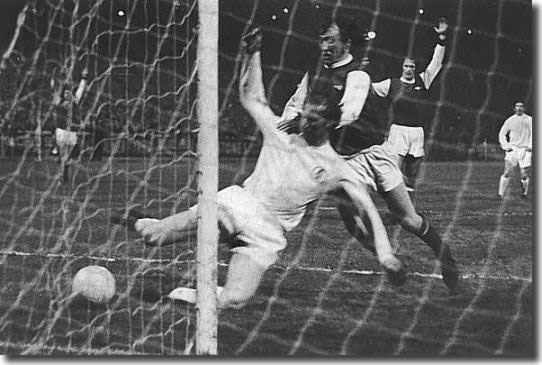 I must have done.'
I must have done.'
Despite the disappointments, Jack was still in the squad that Sir Alf
Ramsey took out to Mexico to defend the World Cup. At 35, though, he was
now second choice to Everton captain Brian Labone, but he won his 35th
and final cap in the 1-0 group win over Czechoslovakia.
'1970/71 was another disappointing
year for Leeds. For a long time we were seven points ahead in the
league, but then Arsenal made an unbelievable late charge, winning virtually
every one of their last six or seven games 1-0. When
we beat them at Elland Road in our last but one game of the season,
I thought we had it won. My first shot ricocheted off the post, and I
just sort of dived in and forced the ball over the line.
'But Arsenal had the last laugh, scoring a last-minute goal against Spurs
in their final game of the season to clinch the championship, in the year
they won the double. We finished runners up with 64 points, the most ever
scored by a team finishing second.
'The Juventus coach was disappointed that his team should have failed
to win the trophy despite not losing a game. But people don't appreciate
how much away goals count in competitions.
'If you go away and draw 0-0, then it's a good result. But if you go
away and draw 1-1, it's a great result. If you can get a couple of goals
away from home, that really gives you an advantage, because even if you
get beaten 3-2, you only have to win 1-0 back at home and you're through.
'Don made us very aware of the importance of not giving goals away at
home. You've got to be patient, you can't go charging off trying to score
at the other end. You've got to keep your shape and fill the midfield.
The main thing is not to over-commit yourselves, because they'll draw
you in and then they'll beat you on the break. If you're patient, the
chances will come. The number of times I read in the papers that our 1-0
lead might not be enough! Nobody ever beat us by two clear goals - that
was a sort of thing with us. It might not have been popular with the press,
but it worked. I don't think there was a better team in Europe than we
were between about 1968 and 1972. Nobody fancied playing Leeds - it was
very difficult to get a result against us.'
1971/72 was a good season for
the club and Jack was still as durable as ever. He would be 37 at the
end of the season and had long since broken Leeds United's appearance
record. A couple of years earier, Don
Revie had signed John Faulkner from Sutton United as cover, and later
added Huddersfield's Roy Ellam, but Jack outlasted both of them and was
still first choice No 5 in his enduring partnership with Norman Hunter.
back to top
'We had a great run in the league, with some famous victories: 5-1 over
both Newcastle and Manchester
United, 6-1 over Nottingham Forest,
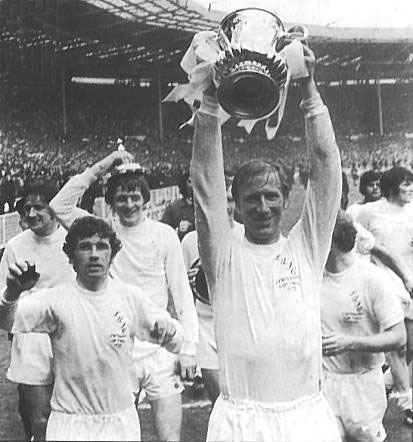 and,
most famous of all, 7-0 over Southampton
on 4 March. We absolutely murdered them that day. The movement, the
pattern - everything seemed to go right. Some of the moves included 24
or 25 passes. Seven of us scored, including me.
and,
most famous of all, 7-0 over Southampton
on 4 March. We absolutely murdered them that day. The movement, the
pattern - everything seemed to go right. Some of the moves included 24
or 25 passes. Seven of us scored, including me.
'The game was shown on Match of the Day, and people started to look at
us in a different way. They started calling us Super Leeds and comparing
us to Real Madrid. I reckon that was the game when people took a look
at us and finally said, "Yeah, this is a good team."'
A week over the Southampton match, Jack played his 600th league game,
appropriately getting the only goal of the home game against Coventry.
Leeds got the reward their football that spring deserved when they won
the FA Cup at last with a 1-0 victory
over Arsenal in the Centenary Cup final, but they were again chasing
the elusive league and Cup Double and celebrations were muted at Wembley,
because the crucial last league game of the season was just two days later:
'The Monday after the Cup final was my 37th birthday - but more important,
we had to go to Molineux.
'We'd been in contention all season, and now we needed to draw or win
for the title. Our two rivals were Liverpool, who were playing their last
game at Arsenal the same evening, and Brian Clough's Derby County, who'd
finished their season.
'We couldn't understand why the FA wouldn't let us play the game a few
days later. Obviously we'd have liked to celebrate winning the FA Cup
after all those attempts, and to make us play only a couple of days later
was, I thought, out of order. But we had no friends in the Football Association.
'Anyway, we went to Molineux to play
Wolves. They went ahead just before half-time, and then in the second
half Derek Dougan made it 2-0. Billy Bremner managed to claw one back,
but although we pressed them hard, we couldn't get that goal we needed.
The final score was 2-1 to Wolves - and with Liverpool failing to beat
Arsenal, Derby County became champions. We were runners-up again.'
Part 1 The early years - Part
2 1966 and all that - Part 4 Football Manager
- Part 5 The Irish Saviour
back to top











 Part 1 The early years - Part
2 1966 and all that - Part 4 Football Manager
- Part 5 The Irish Saviour
Part 1 The early years - Part
2 1966 and all that - Part 4 Football Manager
- Part 5 The Irish Saviour his
injury during the summer and returned for the 1967 Inter Cities Fairs
Cup final against Dinamo Zagreb, held over until late summer. Leeds
lost 2-0 in the away leg, but fancied their chances in the return
at Elland Road. Jack had a goal disallowed and another effort cleared
off the line as Leeds could do no better
than 0-0 and another runners-up finish.
his
injury during the summer and returned for the 1967 Inter Cities Fairs
Cup final against Dinamo Zagreb, held over until late summer. Leeds
lost 2-0 in the away leg, but fancied their chances in the return
at Elland Road. Jack had a goal disallowed and another effort cleared
off the line as Leeds could do no better
than 0-0 and another runners-up finish. Mick
Jones scored on the rebound. We thought we had it won, but then they got
a free kick, the ball got played in, and Ian Hutchinson suddenly appeared
at the near post to make it 2-2.'
Mick
Jones scored on the rebound. We thought we had it won, but then they got
a free kick, the ball got played in, and Ian Hutchinson suddenly appeared
at the near post to make it 2-2.' I must have done.'
I must have done.' and,
most famous of all, 7-0 over Southampton
on 4 March. We absolutely murdered them that day. The movement, the
pattern - everything seemed to go right. Some of the moves included 24
or 25 passes. Seven of us scored, including me.
and,
most famous of all, 7-0 over Southampton
on 4 March. We absolutely murdered them that day. The movement, the
pattern - everything seemed to go right. Some of the moves included 24
or 25 passes. Seven of us scored, including me.